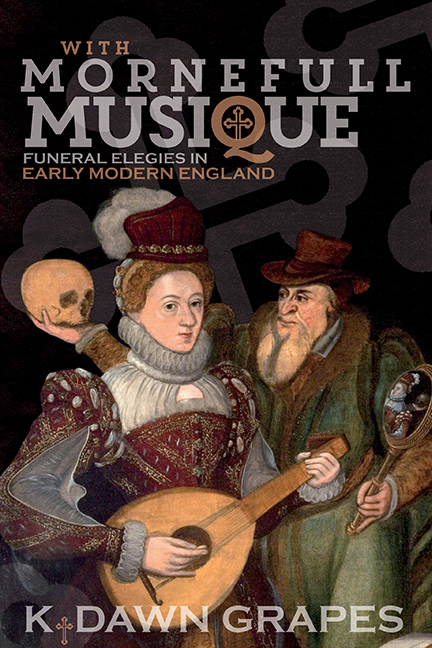 With Mornefull Musique: Funeral Elegies in Early Modern England
With Mornefull Musique: Funeral Elegies in Early Modern England Book contents
- Frontmatter
- Contents
- List of Figures
- List of Music Examples
- Acknowledgements
- Editorial Conventions
- Introduction
- 1 “With Mornefull Musique”: The English Musical Funeral Elegy
- 2 “The Floure of England”: The Earliest Musical Elegies for Sir Philip Sidney
- 3 “Of Griefe and Honour Still”: Elizabethan Courtiers
- 4 “Say Death Hath Lost”: Knights of the Realm
- 5 “Weepe Forth Your Teares”: Laments for a Lost King
- 6 “A Flower of Beutye”: The Feminine Legacy of Queens and Matriarchs
- 7 “For Death of Her”: The Unusual Case of Mary Gascoigne
- 8 “And Music Dies ...”: Musicians and their Stories
- Epilogue
- Appendix: Recordings List
- Select Bibliography
- Index
- Titles listed here were originally published under the series title Music in Britain, 1600–1900
- New titles published under the series title Music in Britain, 1600–2000
3 - “Of Griefe and Honour Still”: Elizabethan Courtiers
Published online by Cambridge University Press: 17 October 2019
- Frontmatter
- Contents
- List of Figures
- List of Music Examples
- Acknowledgements
- Editorial Conventions
- Introduction
- 1 “With Mornefull Musique”: The English Musical Funeral Elegy
- 2 “The Floure of England”: The Earliest Musical Elegies for Sir Philip Sidney
- 3 “Of Griefe and Honour Still”: Elizabethan Courtiers
- 4 “Say Death Hath Lost”: Knights of the Realm
- 5 “Weepe Forth Your Teares”: Laments for a Lost King
- 6 “A Flower of Beutye”: The Feminine Legacy of Queens and Matriarchs
- 7 “For Death of Her”: The Unusual Case of Mary Gascoigne
- 8 “And Music Dies ...”: Musicians and their Stories
- Epilogue
- Appendix: Recordings List
- Select Bibliography
- Index
- Titles listed here were originally published under the series title Music in Britain, 1600–1900
- New titles published under the series title Music in Britain, 1600–2000
Summary
ELIZABETH I's legendary persona was carefully crafted while she was alive, and over time, the mythological aura surrounding the queen and her court has continued to blossom. While thousands of individuals participated in official functions at palaces and estates during the course of Elizabeth's reign, her inner circle of trusted courtiers, those who had direct access to the queen, was quite limited in number. Selected gentlemen and ladies were regularly called to court, but many also spent considerable amounts of time in their home counties. Others maintained houses close to London. Those who were deemed most important were given quarters inside the court. Elizabeth seemed to prefer courtiers in her inner circle who subscribed to a philosophy of self-edification in languages, literature, music, and athletics, and a number of them left behind a corpus of poetry that now stands as the Elizabethan model. Stephen May writes of the courtier-poets who had direct contact with the queen, and defines the court as “the particular social milieu … that dominated national patronage and the exercise of political and economic power.” Certain gentlemen who are included in this narrow definition were so much connected to the Elizabethan court that the association shaped their roles both within a larger courtly community and outside, as leaders both in their home districts and in world affairs.
While a number of peers, such as the Earls of Leicester and Essex, naturally found themselves in this circle, other aristocratic figures who initially held no title were also welcomed (for example, Sir Charles Blount, prior to becoming Baron Mountjoy, and Fulke Greville before being created Baron Brooke). A study of elegiac recipients includes a number of these men, who were well regarded as polished practitioners of the humanist spirit, an outgrowth of the literary tradition. Philip Sidney stands out because of the circumstances of his death, but he struggled to gain respect from his monarch while alive. Other Elizabethan courtiers who stood higher in the queen's esteem, such as Sir Fulke Greville, Sir Henry Lee, and Sir Henry Noel, all received musical funeral tributes from Elizabethan and Jacobean composers.
- Type
- Chapter
- Information
- With Mornefull Musique: Funeral Elegies in Early Modern EnglandFuneral Elegies in Early Modern England, pp. 62 - 90Publisher: Boydell & BrewerPrint publication year: 2018


